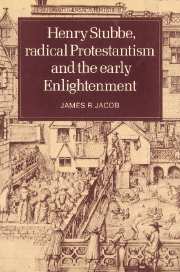Book contents
- Frontmatter
- Contents
- Miscellaneous Frontmatter
- Preface
- Introduction: the historiographical problem
- 1 Hobbesian Independent
- 2 Republican Independent
- 3 Surreptitious naturalism: the invention of a new rhetoric
- 4 ‘Mahometan Christianity’: Stubbe's secular historicism
- 5 Aristotle on the ale-benches
- 6 Court pen: ‘ancient prudence’ and royal policy
- 7 Court to country
- 8 Civil religion and radical politics: Stubbe to Toland
- Epilogue: the paganizing thread
- Notes
- Bibliographical Note
- Index
- Frontmatter
- Contents
- Miscellaneous Frontmatter
- Preface
- Introduction: the historiographical problem
- 1 Hobbesian Independent
- 2 Republican Independent
- 3 Surreptitious naturalism: the invention of a new rhetoric
- 4 ‘Mahometan Christianity’: Stubbe's secular historicism
- 5 Aristotle on the ale-benches
- 6 Court pen: ‘ancient prudence’ and royal policy
- 7 Court to country
- 8 Civil religion and radical politics: Stubbe to Toland
- Epilogue: the paganizing thread
- Notes
- Bibliographical Note
- Index
Summary
…almost all sober men believe that the national clergy, besides all their other good qualities, have this too; that they cannot hope to make their hierarchy subsist long against the Scriptures, the hatred of mankind, and the interest of this people, but by introducing the Roman religion; and getting a foreign head and supporter, which shall from time to time brave and hector the king and parliament in their favour and behalf: which yet would be of little advantage to them, if we had as firm and wise a government as you have in Venice.
Henry Neville, Plato RedivivusFor a year and a half, from the spring of 1672 to the autumn of 1673, Stubbe was attached to the court. He wrote his two major propaganda pieces in ‘the Paper Office at Whitehall,’ and was paid £200 for the job. But Stubbe's career as a court pamphleteer was short-lived. By October 1673 he was recognized as one of the leading propagandists for the ‘country’ opposition that was just then emerging.
Churchmen had remained suspicious of Stubbe, while he wrote for the court. His vigorous defense of the Indulgence did nothing to win them over. During 1673 William Sancroft, Dean of St Paul's, received reports of Stubbe's activities, and in one of these he was clearly associated with the Erastian, tolerationist opinion at court, so despised by the clerical hierarchy.
- Type
- Chapter
- Information
- Henry Stubbe, Radical Protestantism and the Early Enlightenment , pp. 129 - 138Publisher: Cambridge University PressPrint publication year: 1983



